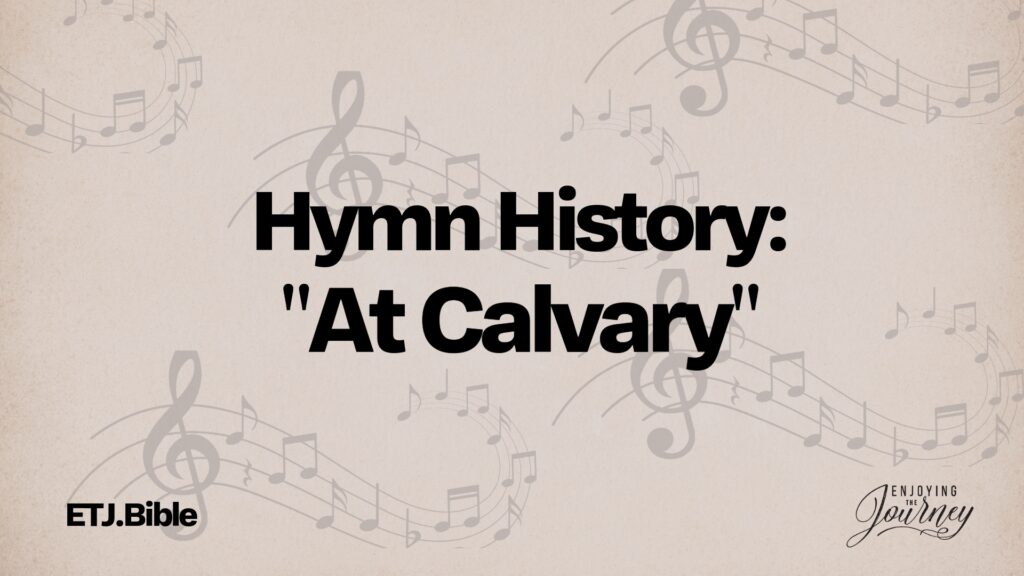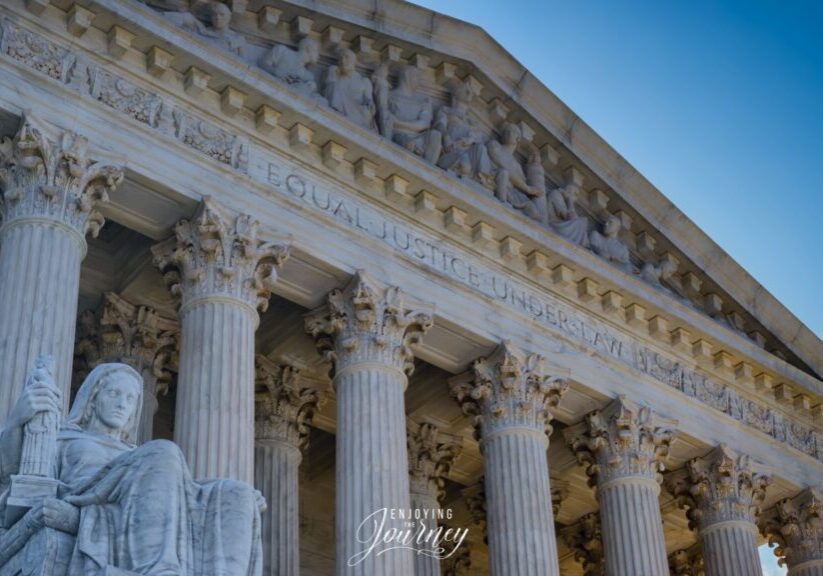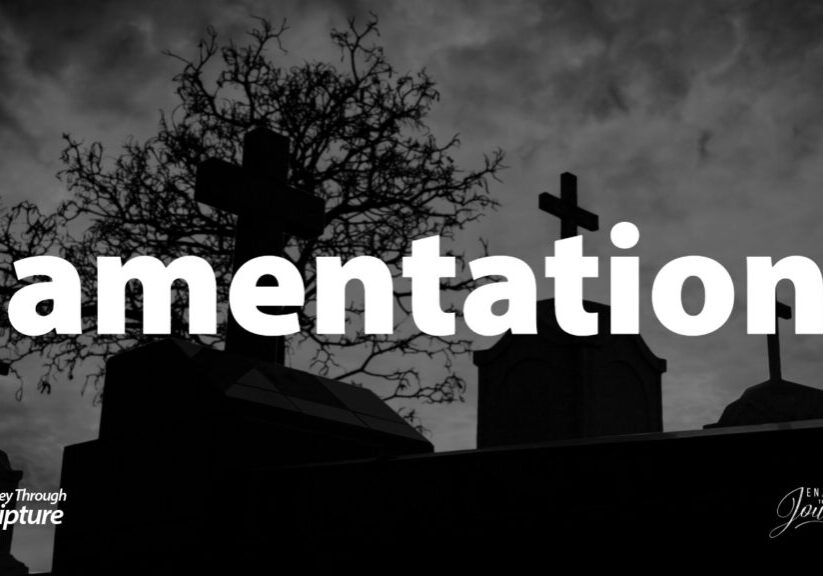
“Who his own self bare our sins in his own body on the tree, that we, being dead to sins, should live unto righteousness: by whose stripes ye were healed.” – 1 Peter 2:24
Listen to this Hymn’s History on Traveler’s Tales
This hymn was written by William R. Newell. The opening words to the hymn “At Calvary” become more meaningful as the story behind the hymn is understood.
William R. Newell: An Unruly Young Man
To have a child grow into his teenage years as a troubled and unruly son can be very burdensome to parents, especially if “dad” is a pastor. In the early 1900s, while President of Chicago’s Moody Bible Institute, R.A.Torrey received a letter from just such a concerned and troubled pastor in Savannah, Ohio. The Ohio youngster, William “Bill” Newell, was causing himself and his family great mental anguish. Pastor Newell sensed that his son, Bill, needed to be under the influence of daily Scriptural teaching, coupled with the fellowship of young people whose attitudes were wholesome and honorable. In the letter to Torrey, Newell asked if his son, Bill, might be enrolled into the Chicago school.
Torrey answered the pastor’s letter, telling him that the school was an Institute where future missionaries and pastors were being trained, not a reform school. This did not deter Newell. He continued, in successive letters, to plead his son’s case.
Finally, after several weeks, Torrey gave in. He contacted Newell, telling him that his son, Bill, could enter MBI, but with certain stipulations and conditions. He was to faithfully attend classes, obey all of the rules and, each day stop by Torrey’s office. Newell and son agreed, and MBI had a new student! Torrey later said, “I never saw a young man with more problems.”
As time went by, Bill remained as good as his word. He tried desperately to be a good student. He obeyed the rules and stopped by Torrey’s office each day if only to say hello. Days became weeks and weeks rolled into months, and small improvements were seen here and there.
William R. Newell: A Born Again Young Man
One day, Bill burst into Torrey’s office with his face aglow. He announced that he had become a Christian. They rejoiced together!
Bill became a model student. He later graduated with his doctorate degree, and after a brief pastoral ministry, returned as a faculty member. Soon afterwards he assumed the post of assistant superintendent of the Moody Bible Institute in Chicago. After teaching at the Institute for several years, Newell devoted his time to an international teaching ministry.
The Birth of a Hymn: At Calvary
The text of the hymn was written in a classroom at Moody Bible Institute during a planning time between classes. Dr. Newell had been teaching about the crucifixion of Jesus Christ in the class period before and was consumed with the thought of that event. The original words were written on the back of a used envelope. The text has strong Biblical connections with at least two verses:
Isaiah 53:6 – “All we like sheep have gone astray; we have turned every one to his own way; and the LORD hath laid on him the iniquity of us all.”
1 Peter 2:24 – “Who his own self bare our sins in his own body on the tree, that we, being dead to sins, should live unto righteousness: by whose stripes ye were healed.”
The two texts remind us of God’s initiative to find us and save us, and also of the atoning work of Christ at Calvary.
How the Hymn was Set ot Music
The bell rang for the next class and Dr. Newell saw Dr. Daniel Towner, the music director of the Institute, as they passed in the hall. Dr. Newell gave the freshly written words to Dr. Towner and asked him to see what he could do to write music for them. Dr. Towner had the next period free and went to a vacant piano room, sat down, and started writing a tune for his friend’s lyrics. An hour later, the bell rang again, and the two saw each other in the hall again. Dr. Towner told Dr. Newell that he had just written the music for the words an hour previous and the two friends went into a piano practice room, sat down by a piano, and sang the new creation together.
Especially surprising is the fact that the melody of the hymn is upbeat, conveying a happy, celebratory mood. Most hymns on the topic of Christ’s sufferings will use melodies, rhythms, and harmonies that are more on the reflective side, even sad, a slower tempo, and possibly a minor key.
This hymn is quite the opposite. The composer celebrates Christ’s accomplishment at Calvary by employing a melody and harmony that tend toward joy and celebration…
Hymn Lyrics: At Calvary
1. Years I spent in vanity and pride,
Caring not my Lord was crucified,
Knowing not it was for me He died on Calvary.
Refrain:
Mercy there was great and grace was free,
Pardon there was multiplied to me,
There my burdened soul found liberty–
At Calvary.
2. By God’s Word at last my sin I learned–
Then I trembled at the Law I’d spurned,
Till my guilty soul imploring turned to Calvary. [Refrain]
3. Now I’ve giv’n to Jesus ev’rything,
Now I gladly own Him as my King,
Now my raptured soul can only sing of Calvary. [Refrain]
4. O, the love that drew salvation’s plan!
O, the grace that brought it down to man!
O, the mighty gulf that God did span – at Calvary. [Refrain]
We are thrilled to share a series of brief accounts of how some of the great hymns of our faith were written. Each synopsis has been compiled through the research of Jerry Vargo and is shared by permission. We hope that these stories will be a help and encouragement to your Christian walk. In this article, we examine the moving story of the hymn, “At Calvary.”







Thank you Micah. I am blessed by your posts. This is the best hymn history I’ve read for this particular hymn. I regularly use hymns and hymn histories in my devotions at Assisted Living facilities and Nursing Homes. There will surely be “the second coming ” of this Hymn history forthwith.
Wow! What a blessing! I am so blessed by the stories of how our great hymns were written and the stories make the words so much more powerful! This one in particular – I remember singing this when I was just a little girl! In March I’ll be 80; so I’ve been singing this one a l-o-n-g time! I have the hymn book from my church and often use it in my time with the Lord. I loved the comment about how songs about the crucifixion are often slow, quieter, or in the minor key; but this one is upbeat because it is actually a celebration of what Christ has done for us! I love this! Thank you for sharing the stories!
It is a great one!
Pastor Jack Gwinn, who went to college with my father loves this hymn. But tells me he is convicted by the verse, “Now I’ve given to him everything..” He said he cannot sing it because he has not given him everything.
This comes from one of the most generous man I know who has given much to the service of the Lord.
What a challenging thought, have I given to him everything?
Great thought and a good man.